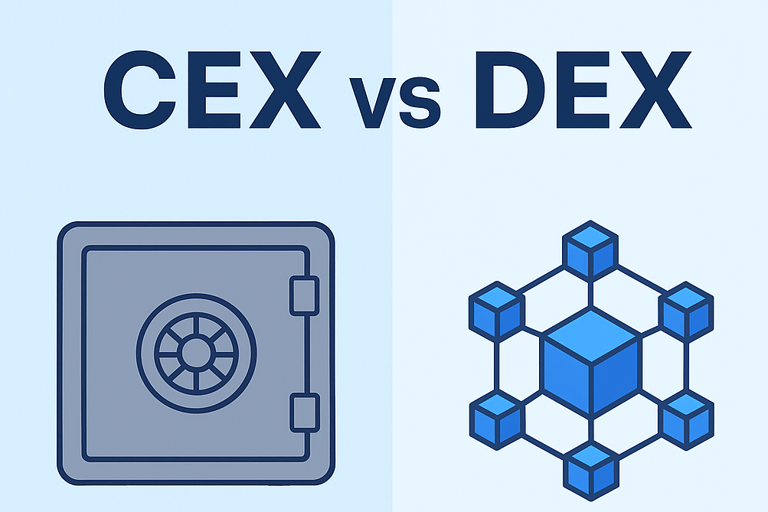CEX vs DEX in 2026: Which Crypto Exchange is Better? | DropFinder
Explore the key differences between centralized (CEX) and decentralized (DEX) exchanges in 2026. Compare security, liquidity, and control with DropFinder insights.
LATEST AIRDROPCRYPTO NEWS
10/3/20254 min read
CEX vs DEX Exchanges in 2026: Which is Better?
The crypto world is evolving at lightning speed, and one of the most common debates for investors and traders is whether centralized exchanges (CEX) or decentralized exchanges (DEX) are the better choice. Each comes with unique strengths, weaknesses, and risks. As 2026 continues to shape the future of digital finance, understanding these differences is essential for anyone dealing with cryptocurrencies.
In this blog, we’ll dive deep into what CEX and DEX exchanges are, compare their features, highlight their pros and cons, and help you decide which option works best for your investment strategy. We’ll also include insights from platforms like DropFinder, which tracks crypto trends, airdrops, and safety in the evolving market.
What is a Centralized Exchange (CEX)?
A centralized exchange (CEX) is a crypto trading platform operated by a company or organization that acts as a middleman between buyers and sellers. Well-known examples include Binance, Coinbase, Kraken, and KuCoin.
These exchanges work much like traditional stock exchanges or banking platforms, where users deposit their funds and the platform manages orders, transactions, and liquidity.
Key Features of CEX:
Operated by a central authority.
High liquidity due to large user bases.
User-friendly interfaces for beginners.
Offer advanced features like futures trading, margin trading, and staking.
Regulatory compliance depending on the jurisdiction.
In short, a CEX is like the "traditional bank of crypto."
What is a Decentralized Exchange (DEX)?
A decentralized exchange (DEX) allows users to trade cryptocurrencies directly from their wallets using blockchain technology, without relying on a central authority. Popular DEX platforms include Uniswap, SushiSwap, PancakeSwap, and dYdX.
DEX platforms use smart contracts to execute trades automatically, removing intermediaries. Users stay in control of their private keys and funds at all times.
Key Features of DEX:
Peer-to-peer (P2P) trading.
Powered by smart contracts and blockchain protocols.
No need to hand over funds to a central authority.
Often supports new tokens before CEX listings.
Increased privacy compared to centralized platforms.
In simple terms, a DEX is like "crypto trading without the bank."
The Core Differences Between CEX and DEX
Let’s break down the major differences between CEX and DEX:
Control of Funds
CEX: Funds are stored in the exchange’s wallets.
DEX: Users keep full control of their funds.
Liquidity
CEX: Usually has deep liquidity due to large user bases and institutional players.
DEX: Liquidity depends on users who provide it, sometimes limited for smaller tokens.
Ease of Use
CEX: Beginner-friendly with apps, charts, and customer support.
DEX: Can be intimidating for new users due to wallet connections and gas fees.
Security
CEX: Vulnerable to hacks since funds are held centrally.
DEX: More secure since users hold their private keys, but smart contract bugs pose risks.
Regulation
CEX: Complies with KYC/AML regulations in most regions.
DEX: Mostly unregulated and anonymous.
Features
CEX: Margin, derivatives, lending, staking, fiat on/off ramps.
DEX: Token swaps, yield farming, liquidity pools.
Costs
CEX: Charges trading and withdrawal fees.
DEX: Users pay blockchain gas fees, which can spike during network congestion.
Advantages of Centralized Exchanges (CEX)
High Liquidity: Large trading volumes ensure smooth transactions.
User-Friendly: Perfect for beginners with easy interfaces.
Customer Support: Help desks and dispute resolution.
Fiat Integration: Easy to buy crypto with credit/debit cards or bank transfers.
Advanced Trading Tools: Ideal for professional traders.
Disadvantages of Centralized Exchanges (CEX)
Hacks & Security Risks: Storing funds on CEX means trusting a third party.
Regulatory Risks: Subject to government crackdowns or bans.
Custody of Funds: Users don’t truly own their assets (Not Your Keys, Not Your Coins).
Withdrawal Limits: Some platforms restrict daily withdrawals.
Advantages of Decentralized Exchanges (DEX)
Full Control: Users always own their assets.
Privacy: No KYC in most cases.
Access to New Tokens: Early trading opportunities before CEX listings.
Resistant to Regulation: Harder for governments to shut down.
Global Accessibility: Open to anyone with a crypto wallet.
Disadvantages of Decentralized Exchanges (DEX)
Low Liquidity: Can be difficult to trade large amounts.
High Gas Fees: Especially on Ethereum-based DEX platforms.
Complex Interfaces: Not beginner-friendly.
Smart Contract Risks: Vulnerabilities in code can lead to losses.
Lack of Customer Support: If something goes wrong, you’re on your own.
CEX vs DEX in 2026 – New Trends
The landscape is changing fast in 2026:
Hybrid Exchanges: Some platforms combine CEX features with DEX decentralization for the best of both worlds.
AI-Powered Security: Both CEX and DEX are integrating AI to detect scams and fraud.
Layer 2 Solutions: DEX platforms are adopting Layer 2 scaling to reduce gas fees.
Regulatory Clarity: Governments worldwide are moving toward clearer crypto laws, which may affect CEX operations more than DEX.
Cross-Chain Trading: DEX platforms are integrating cross-chain swaps, making it easier to trade tokens from different blockchains.
Which is Safer: CEX or DEX?
Safety is the biggest concern for crypto users.
CEX: Safer for beginners, but prone to hacks and regulatory risks.
DEX: Safer in terms of ownership, but risky if smart contracts fail.
The safest strategy may be to use a combination of both. Many investors buy and store their assets on DEX while using CEX for high-liquidity trades.
Case Studies in 2025–2026
CEX Hacks: In late 2025, several smaller CEX platforms faced breaches, leading to millions in stolen assets.
DEX Smart Contract Exploits: Certain DeFi protocols lost funds due to poorly audited contracts.
DropFinder Insights: According to DropFinder, new investors flock to CEX for convenience but eventually explore DEX for long-term security.
Which is Better in 2026?
The answer depends on your needs:
Choose CEX if:
You are a beginner.
You need customer support.
You want to use fiat money to buy crypto easily.
You want advanced tools for trading.
Choose DEX if:
You want full control of your funds.
You prioritize privacy and decentralization.
You are comfortable with self-custody wallets.
You are exploring DeFi opportunities like yield farming.
In 2026, neither is universally better. Instead, it’s about balancing both CEX and DEX depending on your goals.
Conclusion
The battle of CEX vs DEX continues in 2026, but the truth is both play a vital role in the crypto ecosystem. CEX offers security, liquidity, and convenience for new users, while DEX provides freedom, privacy, and full control for experienced investors.
For most people, the smart move is not to choose one over the other but to use both strategically. Store long-term investments on decentralized wallets while leveraging centralized exchanges for liquidity and fiat access.
As highlighted by DropFinder, the crypto industry is moving toward a future where hybrid models may dominate, blending the best of CEX and DEX into one seamless experience. Staying informed and cautious is the key to navigating this evolving landscape.




